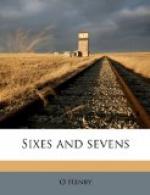“But ‘twas of the Imperor Nero I was goin’ to tell ye. I struck into Rome, up the Appian Way, on the night of July the 16th, the year 64. I had just stepped down by way of Siberia and Afghanistan; and one foot of me had a frost-bite, and the other a blister burned by the sand of the desert; and I was feelin’ a bit blue from doin’ patrol duty from the North Pole down to the Last Chance corner in Patagonia, and bein’ miscalled a Jew in the bargain. Well, I’m tellin’ ye I was passin’ the Circus Maximus, and it was dark as pitch over the way, and then I heard somebody sing out, ‘Is that you, Michob?’
“Over ag’inst the wall, hid out amongst a pile of barrels and old dry-goods boxes, was the Imperor Nero wid his togy wrapped around his toes, smokin’ a long, black segar.
“‘Have one, Michob?’ says he.
“‘None of the weeds for me,’ says I—’nayther pipe nor segar. What’s the use,’ says I, ‘of smokin’ when ye’ve not got the ghost of a chance of killin’ yeself by doin’ it?’
“‘True for ye, Michob Ader, my perpetual Jew,’ says the Imperor; ’ye’re not always wandering. Sure, ’tis danger gives the spice of our pleasures—next to their bein’ forbidden.’
“‘And for what,’ says I, ’do ye smoke be night in dark places widout even a cinturion in plain clothes to attend ye?’
“‘Have ye ever heard, Michob,’ says the Imperor, ’of predestinarianism?’
“‘I’ve had the cousin of it,’ says I. ’I’ve been on the trot with pedestrianism for many a year, and more to come, as ye well know.’
“‘The longer word,’ says me friend Nero, ‘is the tachin’ of this new sect of people they call the Christians. ’Tis them that’s raysponsible for me smokin’ be night in holes and corners of the dark.’
“And then I sets down and takes off a shoe and rubs me foot that is frosted, and the Imperor tells me about it. It seems that since I passed that way before, the Imperor had mandamused the Impress wid a divorce suit, and Misses Poppaea, a cilibrated lady, was ingaged, widout riferences, as housekeeper at the palace. ‘All in one day,’ says the Imperor, ’she puts up new lace windy-curtains in the palace and joins the anti-tobacco society, and whin I feels the need of a smoke I must be after sneakin’ out to these piles of lumber in the dark.’ So there in the dark me and the Imperor sat, and I told him of me travels. And when they say the Imperor was an incindiary, they lie. ’Twas that night the fire started that burnt the city. ’Tis my opinion that it began from a stump of segar that he threw down among the boxes. And ’tis a lie that he fiddled. He did all he could for six days to stop it, sir.”
And now I detected a new flavour to Mr. Michob Ader. It had not been myrrh or balm or hyssop that I had smelled. The emanation was the odour of bad whiskey—and, worse still, of low comedy—the sort that small humorists manufacture by clothing the grave and reverend things of legend and history in the vulgar, topical frippery that passes for a certain kind of wit. Michob Ader as an impostor, claiming nineteen hundred years, and playing his part with the decency of respectable lunacy, I could endure; but as a tedious wag, cheapening his egregious story with song-book levity, his importance as an entertainer grew less.




